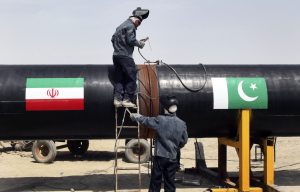Pakistan’s interim government gave the go-ahead last month for the building of the first 80 kilometers of the Iran-Pakistan gas pipeline project within Pakistani borders. Pakistani officials expect the work to commence in the coming weeks.
This has come after Iran threatened to bring charges against Pakistan in international court over Islamabad’s failure to finish the project on schedule. Pakistan has been under pressure from Iran to finish construction of the pipeline on its side of the border since Iran completed construction of its portion of the pipeline more than a decade ago.
Iran and Pakistan reached an agreement on the gas pipeline in June 2009. Although Iran finished building 900 kilometers of the pipeline on its side in 2011, work on Pakistan’s side did not begin until recently.
As part of the latest arrangement, Iran has reportedly offered Pakistan time until September 2024 to finish the project to avoid around $18 billion in fines.
Pakistan has repeatedly stated its intention to begin construction on the gas pipeline project with Iran. However, each time it took a step in that direction, it risked facing penalties for violating U.S. sanctions on Tehran, which restrict Iran’s energy exports to Pakistan and other neighboring countries.
In 2019, Pakistan formally informed Iran that as long as Tehran is subject to U.S. sanctions, the initiative to build an Iran-Pakistan gas pipeline cannot be carried out. It seems that Pakistan is unlikely to be able to begin work on the project this time around as well due to this problem.
However, instead of telling Iran it cannot build the pipeline, Pakistan is looking into ways to get over the U.S. sanctions. For instance, Pakistan appears to be considering formally contacting the U.S. government to request a waiver of sanctions on the Iran-Pakistan gas pipeline project, according to confirmation provided by Petroleum Minister Musadik Malik on Monday.
“We will try to seek exemptions by presenting political and technical reasons against American sanctions,” Malik stated, adding, “We will present Pakistan’s case comprehensively.”
“The government will also wage a vigorous lobbying campaign to secure the waiver,” he stressed.
However, Pakistan’s Foreign Office has declared that the country did not require an exemption from U.S. sanctions to construct its share of a pipeline to import natural gas from Iran. “It is a segment of the pipeline which is being built inside Pakistani territory. So, we do not believe that at this point there is room for any discussion or waiver from a third party,” the spokesperson for Pakistan’s Foreign Ministry, Mumtaz Zahra Baloch, stated.
Pakistan’s ongoing approach to the issue suggests two things. On the one hand, it seems it wants to convey to Iran that it is serious about building the pipeline, while on the other hand, it is telling the United States that it is complying with its sanctions regime on Tehran by not going ahead with the project.
Despite the Foreign Office’s assertion that Pakistan does not need U.S. consent, Pakistan is not likely to build the pipeline without Washington’s agreement. It doesn’t appear that Pakistan wants to enrage Washington by moving forward with building a pipeline with Iran, a country that is involved in a critical Middle East regional conflict with the United States. At this point, Pakistan needs the U.S. much more than it does Iran due to its precarious economic situation and urgent need for money from foreign donors.
Pakistan is not going to start building the Iran gas pipeline just to avoid Iranian penalties. For the past 10 years, Pakistan has been facing the prospect of penalties, but it has not begun building. Many Pakistani policymakers are confident that Pakistan can defend its position at any international tribunal by arguing that sanctions are a major hurdle. The country may even rely on Washington’s support to avoid any penalties if Tehran decides to take the matter to an international court.
The crucial question is how Pakistan intends to persuade the United States to provide a waiver for the construction of the gas pipeline. Pakistan doesn’t appear to have many options for talks with the U.S. It currently has little influence over Washington.
During a congressional hearing last week, Donald Lu, the U.S. assistant secretary of state for South and Central Asia, stated that the department was keeping an eye on the proposed pipeline between Iran and Pakistan. “We have also not heard from the government of Pakistan [on a] desire for any waiver for American sanctions that would certainly result from such a project,” Lu stated.
Lu also informed the committee that Pakistan would find it difficult to secure funding for the project: “I don’t think many international donors will be interested in funding such an endeavor.”
It is obvious that the U.S. opposes Pakistan constructing the pipeline, but it remains to be seen if Pakistan can persuade Washington to provide a waiver through lobbying and other means. In any event, Pakistan faces a difficult task in trying to persuade the U.S. that this project might benefit everyone while avoiding penalties from Iran.

































